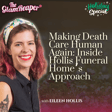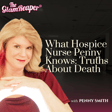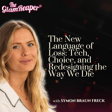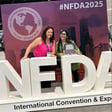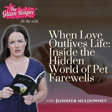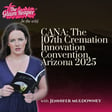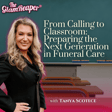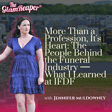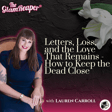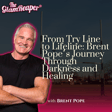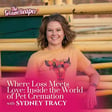
Rebuilding Faces, Restoring Families: The Embalmer Behind Military Repatriations
Why do we wait until someone dies to learn how to deal with death?
In this episode of The Glam Reaper Podcast, Jennifer Muldowney sits down with Jennifer Lares, a licensed funeral director, educator, and former U.S. Army mortuary officer who managed repatriations across Europe and Africa. Together, they open a side of the funeral world that most people never see — where compassion, ethics, and resilience meet REALITY.
Jennifer Lares reveals what it’s really like behind military and civilian funerals, how empathy and education can change the way we face loss. From exposing industry silence and scandals to rethinking Direct Cremation and modern airbrush cosmetics, this conversation challenges everything you thought you knew about death care.
It’s real. And it might just change how you see life, grief, and the people who serve behind the curtain of death.
🎧 Tune in to discover how curiosity, courage, and compassion can transform the way we say goodbye.
Key Topics:
-Honoring the fallen and the unseen work behind repatriation
-Redefining empathy and teamwork in funeral service education
-The courage to speak up in an industry built on silence
-Reimagining beauty, dignity, and goodbyes through modern death care
-Learning to face death with curiosity, not fear
Quotes from the episode:
“We know that we’re all going to die, and yet we don’t learn anything about it until you have to. So why would you not involve this in education when you’re growing up?”
-Jennifer Lares
“But if you don’t evolve, you dissolve.”
-Jennifer Muldowney
Timestamp:
[00:00] Podcast Intro
[00:29] Jennifer Lares shares her experience as a U.S. Army mortuary officer in Germany, reflecting on the challenges of repatriating fallen service members, cultural differences around death, and her mission to elevate funeral education through advanced embalming and training.
[10:23] She talks about teaching empathy-led teamwork, sensitive communication with grieving families, and modernizing end-of-life care through airbrush cosmetics and progressive education.
[21:52] The conversation moves to licensing and specialization in funeral service, the staffing challenges across states, and Jennifer’s honest take on the California mortician scandal—why abuses happen and why the industry needs stronger ethics and protection.
[32:30] Jennifer discusses gender bias, inequality, and society’s fascination with scandal and death. She calls for rethinking cremation, respecting diverse beliefs, and re-educating the public on the sacred value of ritual and the body.
[43:19] To close, she highlights the need for transparency, curiosity, and higher standards—urging the profession to embrace accountability, continuous learning, and stronger oversight to restore trust in death care.
[53:57] Outro
Connect with Jennifer Lares:
LinkedIn: linkedin.com/in/jennifer-lares-a09163302
Websites - mullingmortician.com
Instagram: @mullingmortician
Connect with Jennifer/The Glam Reaper on socials at:
Instagram - https://www.instagram.com/jennifermuldowney/
TikTok - https://www.tiktok.com/@therealglamreaper
YouTube - https://www.youtube.com/@TheGlamReaperMuldowney
LinkedIn - https://www.linkedin.com/in/jennifermuldowney/
Facebook Page - https://www.facebook.com/MuldowneyMemorials/
Email us - glamreaperpodcast@gmail.com
Shop Merch - https://the-glam-reaper.printify.me/products
Listen to The Glam Reaper Podcast on Apple Podcasts:
https://podcasts.apple.com/us/podcast/the-glam-reaper-podcast/id1572382989?i=1000525524145
The Glam Reaper® AMAZON Storefront - https://amzn.to/4hObpOh
